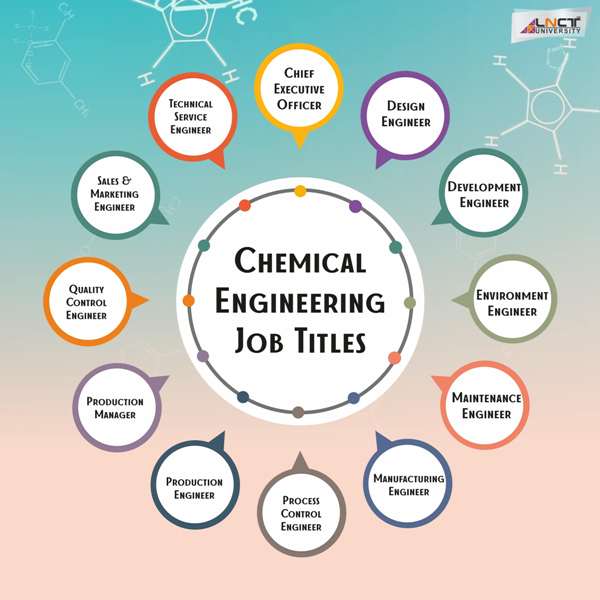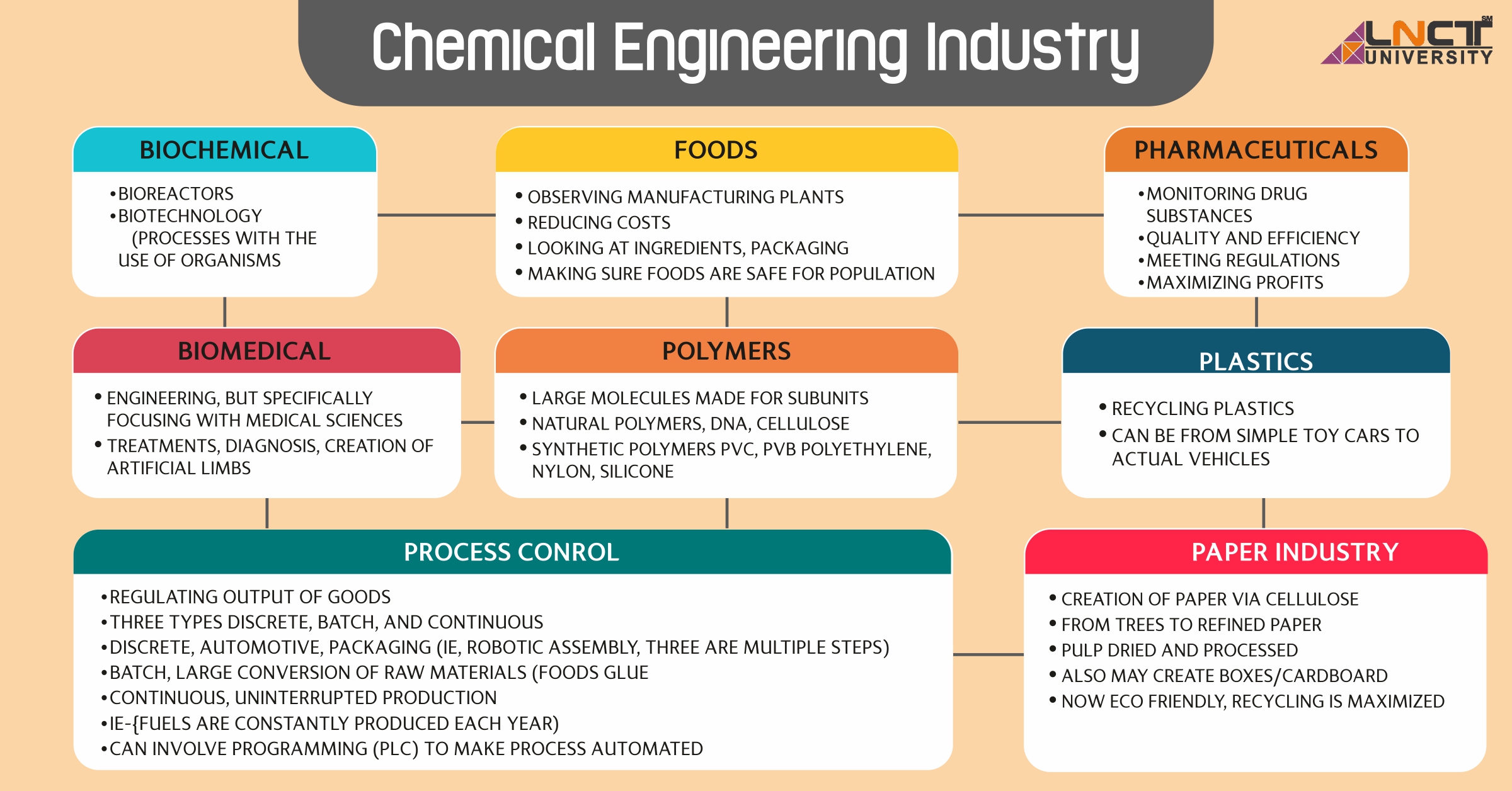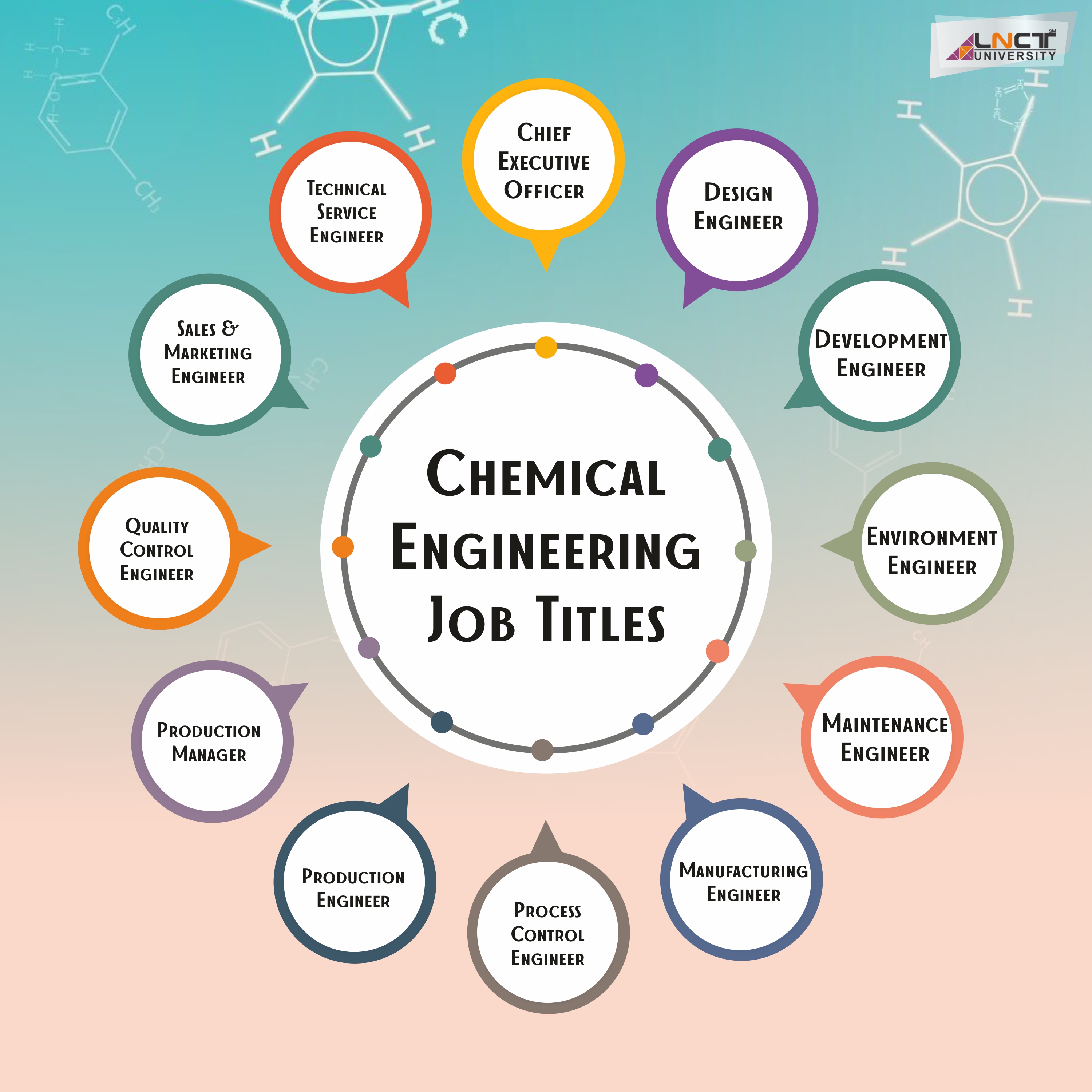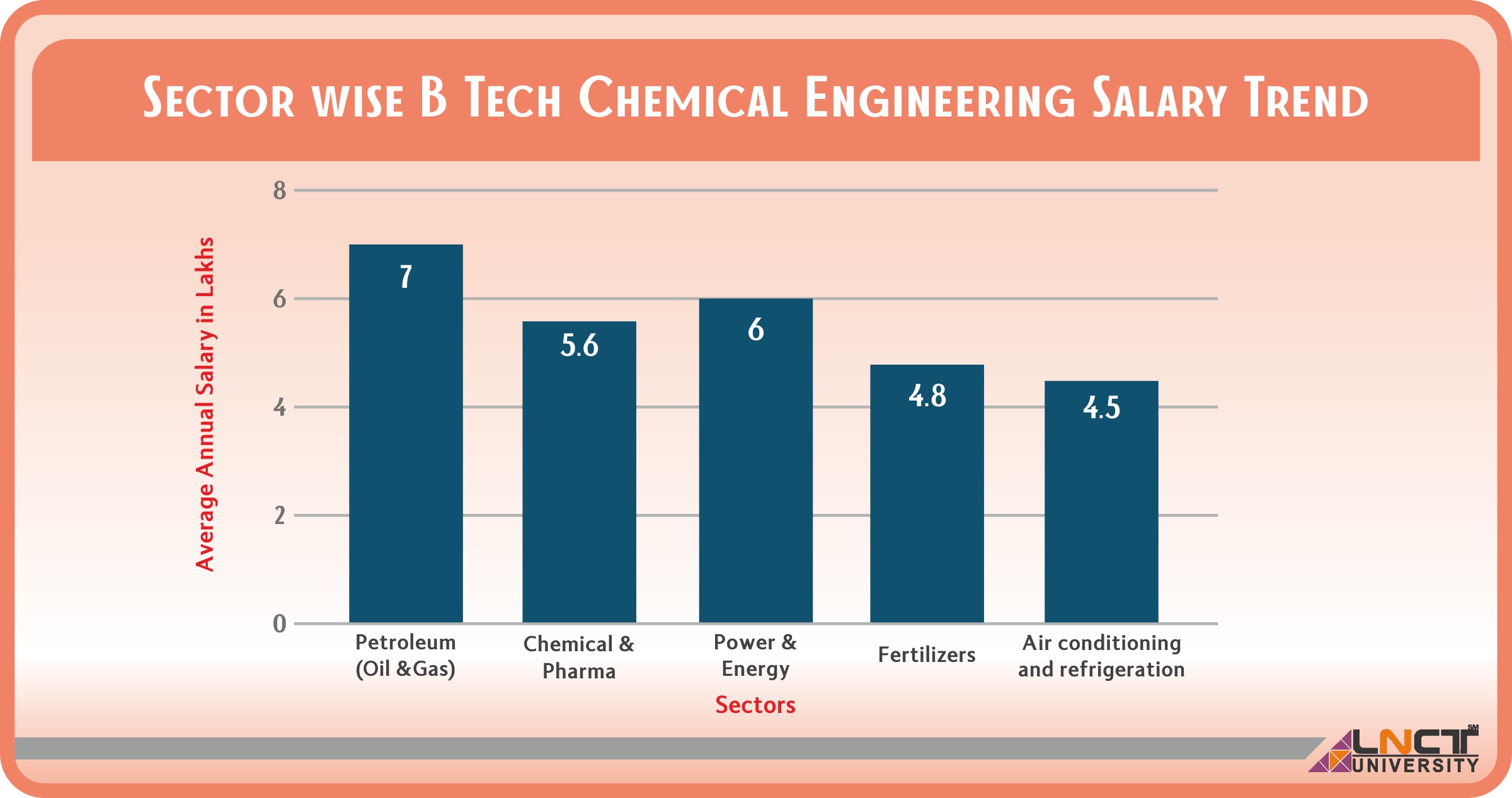Scope of Chemical Engineering by 2025
Engineering and technology are at their all time high within the present times. Various specializations within the fields of Engineering, equip people with essential pre requisites to survive and cope in the coming world. One such important aspect of the study is the field of Chemical Engineering, a radical knowledge of chemicals, and its various components, alongside the multitude of functions that it’s capable of performing, is an important prerequisite of the sector .
This field is all about converting raw materials into convenient products like clothes, food and drink, and energy. Chemical engineers specialize in processes and products – they develop and style processes to make products; either that specialize in improving existing processes or creating new ones. This suggests that they’re also concerned with managing resources, protecting the environment and health and safety.
Why Chemical Engineering trains Universal Engineers?
Chemical engineers are sometimes called ‘universal engineers’ because it’s a broad discipline – they’re essentially concerned with transforming one thing into another. Within the coming times, with the upsurge jobs are set to boom in this sector. The subsequent paper attempts to trace the scope and relevance of chemical engineers within the coming decades. The sector holds exceptional power to make changes on the planet. The paper is an effort in justifying the same. It further goes on to explore the varied job opportunities and employment of the world.
Scope of Chemical Engineering from 2021 – 2024
Chemical engineers cater to a wide spread of requirements perfectly in line with the talents of the industry, especially within process development. One among the most important tasks of this department is to recruit and train the emerging young talent. A chemical engineer assists in defining new processes, improving established products and solving environment, health and safety issues.
Chemical engineer takes prominent roles within the stages of a product life cycle and through their communication skills and cooperation with other colleagues working in various fields, so as to satisfy the industry requirements.
The Institutes of Technology are encouraged to continuously offer the updated & efficient education in chemical engineering. They apply the principles of chemistry, biology, physics, and arithmetic to unravel problems that include in the assembly or usage of chemicals, fuel, drugs, food etc. Operation and equipment for large-scale manufacturing, plan and test production methods and byproducts treatment, and direct facility operations are been designed by them.
Chemical engineers also conduct research within the life sciences, biotechnology, and business services. The typical yearly salary for chemical engineers was $108,770 in May 2019.
Major Branches of Chemical Engineering
A wide sort of courses is offered under the umbrella of chemical engineering. It includes different arenas like that of biotechnology and nanotechnology. Chemical engineers employ themselves in various aspects of producing and management.
Within the coming times, with the extreme use of technology, many of those sectors are set to boom and make an outsized number of job opportunities. It is advisable for aspirants to concentrate on one or the other field to realize expertise which will eventually help them with essential pre requisites to cope within the coming times.
This is a modeling technique that’s employed within the process design in chemical engineering. It includes the usage of purpose built software to make a system of inter-connected components, which are then solved to predict the dynamic behavior of the system.
The reactions involved are often as simple as mixing of two substances, or as complicated as the reactions in refinery. It requires proper education of the properties and qualities of the chemicals involved within the reactions, also the physical properties and characteristics of the components like tanks, vessels, pumps, pipes etc.
Chemical Engineering – Chemical Process Modelling
Biotechnology may be a whole spectrum of biology, involving the use-age of living systems and organisms to make a spread of products. Late 20th and early 21st centuries, the sector has developed itself to incorporate new and wholesome spectrum of sciences, like recombinant gene technique, genomics, applied immunology, and development of diagnostic tests, pharmaceutical therapies etc
Chemical Engineering – Biotechnology
Biochemical Engineering/ Bioprocess Engineering
This is a field of study with roots arising from biological engineering & chemical engineering. Bioprocess, mainly deals with the concept of structural design, building, and advancement of unit processes which incorporates organic molecules and organisms, it is diversely used in areas of interest like biotechnology, water treatment processes, bio-fuels, food, pharmaceuticals. Biochemical Engineer’s work involves detections which are developed by biologists and chemists in laboratory and translate that to large-scale fabrication process and more.
chemical Engineering Bioprocess Engineering
Chemical Reaction Engineer’s within the field of chemical engineering affect the concept and conceptualization of reactors. The term relates to catalytic reaction system where either a uniform or heterogeneous catalyst is present in reactor. The reactor isn’t present by itself, but rather is unified into a task, either in reactive separations vessels, retorts and photo-catalytic facet. The issues related to the un-geared effects, on reaction kinetics are additionally considered as a crucial a part of the method.
Chemical Technologists and Technicians
Technicians are workers who provide technical services and support in chemical related fields. They work under direct Management or may go independently, as per their position and duties. Their work environments vary widely and include, but aren’t lean to, workshop and industrial settings. It’s nearly impossible to generalize the duties of chemical technicians as their individual jobs vary greatly.
chemical Engineering Chemical Technologists and Technicians (2)
Electrochemistry may be a field related to chemistry and therefore the dynamics it shares with electrical potential as a quantifiable phenomenon. These reactions involve the instant of electrons between electrodes via a conducting phase, essentially but not necessarily external circuits or an insulating electrolyte or ionic species in solution.
When a reaction is effected by a possible difference, as in electrolysis, or if electrical potential results from a reaction as during a battery or cell, it’s called an electrochemical reaction.
Unlike chemical reactions, in electrochemical reactions electrons aren’t transferred directly between molecules, but via the aforementioned electronically- and ironically-conducting circuits, respectively.
Chemical Engineering Electrochemistry-supplement text
This multi-disciplinary field of fabric science, which is more commonly termed as material sciences and engineering, covers a good range of aspects from design to the invention of newer materials, primarily solids. The sector emerged when the researchers began to logically thinking from physics, chemistry and engineering and relate them to metallurgy. As such, the sector was long considered by academic organization as a sub-field of those related fields.
In the mid 19th century, material science began to be more widely known as a selected and unique field of science and engineering. Materials scientist’s works on, how the timeline of processing influences the structure, and the material’s execution and its properties. The grasp of processing-structure-properties relationships is understood as materials paradigm.
This paradigm is employed to market depth during a sort of research areas, including nanotechnology, biomaterials and metallurgy. Materials science is additionally an important a part of forensic engineering and failure analysis. Material sciences are employed in many fields like metallurgy and aerodynamics etc.
Chemical engineering material science
Nanotechnology, is that the usage of matter on a supra-molecular, atomic & molecular scale for industrial purposes. The widespread description of nanotechnology relates to the actual technological goal of particular manipulating atoms or molecules for development of macro-scale articles, which are now referred as molecular technology.
The National Nanotechnology Initiative describes nanotechnology dealing with the manipulation of matter with a minimum of one dimension sized from 1 to 100 nanometers. It deals with a varied number of branches including, surface sciences, energy storage engineering, microfabrication, biology, chemistry and more. Nanotechnology has created many new material and devices like nano-electronics, nano-medicine and other consumer centric product.
chemical Engineering Nanotechnology
Challenges, Duties and Fields of Education in Chemical Engineering
Chemical engineers are widely employed in vivid industries & factories to assist within the procedure of fabrication of wide spectrum of articles & finished products like textile fabrics and pharmaceuticals. Chemical engineers are expected to conduct studies to develop new & improvised fabrication processes and establish safety procedures and preventions for those working with dangerous chemicals.
Engineers are expected to develop procedure for separating articles of gases & liquid, or of generating electrical currents, by using controlled chemical processes. Designing and planning of the layout for the equipments used are developed by them. They conduct an enormous number of tests and monitor the performance & results of processes throughout production and troubleshoot problems with the manufacturing processes.
Evaluation of kit and processes to make sure conformity with safety and environmental regulations is additionally done by them. Estimations of the manufacturing cost of management is also a responsibility. Process engineers; concentrate on a particular process, like oxidation and other reaction processes. Others concentrate on a specific field, like nano-materials & biological engineering there are others who concentrate on creation of specific products.
They should posses an undergraduate degree in Chemical engineer or its related fields. Programs in chemical engineering usually take 4 years to finish and include classroom, laboratory, and field studies.
High school students curious about studying chemical engineering will enjoy taking science courses, like chemistry, physics, and biology. Chemical Engineers must pursue courses in mathematics, including calculus, arithmetic and calculus.
At some universities, students can prefer to enroll in 5-year engineering programs that cause both a bachelor’s degree and a master’s degree. A graduate degree, which can include a degree up to the Ph.D. level, allows an engineer to figure in research and development or as a post-secondary teacher. A number of Institutes offer internships or cooperative programs in partnership with the industry.
Within such programs, aspirants acquire experience in the practical fields all the while completing their education. A program in this consists of courses in chemistry, physics, and biology. These also consists of applying the sciences to the control of chemical, physical, and biological processes design, & analysis
Some Essential Skills required being a chemical engineer
Mathematical skills – the utilization of principles of advanced math topics like troubleshooting, calculus for analysis and design may be a must for the efficient functioning of chemical engineers.
Creativity- they need to explore ways of applying the principles learnt as they work to create new materials, new applications in chemical and biomedical engineering & advanced manufacturing techniques. Creativity and innovative thinking make them unique in their own way.
Interpersonal skills– Their role is to place principles into practice in fabricating industries. Engineers must develop smooth working relationships with others involved in fabrication processes so as for the efficient working of the industry.
Ingenuity- They learn the concepts of chemical engineering, but their work requires them to use those essentials to precision when into production & to unravel similar problems.
Analytical skills– they need to troubleshoot designs that don’t work as planned. They need to ask the right questions then find solutions thereto work.
Problem-solving skills– In designing equipment and processes for fabrication, these engineers must be ready to predict and identify problems, including such issues as workers’ safety and problems associated with manufacturing and environmental protection.
Job scope and Opportunities in Chemical Engineering
There are a good range of factories that need chemical engineers, including energy, information technology & pharmaceutical. These roles involve fabricating existing processes and generating new methodology for changing materials. There are other sectors, decisions and careers which involve the skill set created during a chemical engineering degree – including consultancy quality assurance and manufacturing.
Depending on the role there are some risks related in working in this field, one maybe exposed to hazards handling chemicals and with plant equipment. But, risks are often prevented if safety processes are followed.
There are great opportunities for chemical engineering graduates; the prospects for higher earnings within the profession is extremely good, in certain industries, for instance , oil and contracting, will attract particularly high salaries.
Chemical Plant and System Operator
You might get recruited by manufacturing companies that make soaps, coating, pesticide manufacturing, and paint. Chemical engineers secure each one of the apparatus utilized in chemical units are working as per standards. Hence they need to examine, make tests, and instruct all involved people regarding, the way to use the apparatus.
Occasional test are run to see for any troubleshoots or suggest adjustments. They are mostly intent to enhance unit safety, efficiency and quality and produce great results.
Manufacturing Production Technician
The biggest probable employers for aspirants in Chemical Engineering are chemical goods manufacturing companies. Chemical engineers work directly with machinery and equipment utilized in the method of producing raw materials like oil, iron, coal, etc. or goods like- clothing, medication, pesticides, etc. They’re liable for fixing the equipment and ensuring all regulations and safety measures are met.
During the manufacturing process, chemical engineers, run tests, monitor equipment, and adjust equipment operations, if needed. They also inspect finished products, check their quality, and make other inspections to form sure they might meet customer satisfaction.
Food scientists
Not surprisingly, Chemical Engineering graduates are largely pursued by food manufacturing companies, also in universities, government organizations, and research institutes.
One among the foremost popular careers among chemical engineers is that of the food scientist position, that involves evaluating the nutritional value, color, flavor and texture of food. In this field, chemical engineers combine knowledge and skills in Chemistry, Microbiology and Engineering to check food samples, produce new food products and confirm the top result meets government , processing and consumer standards.
Biotechnologist
Position of a Biotechnologist is of high importance for pharmaceutical companies and medical research institutes. Within this field, chemical engineers can work to develop new drugs, experimental treatments, vaccines and even artificial organs.
They’re going to study, research and apply principles of human genetics to living cells and use biological techniques to make antibiotics, insulin, hormones, and transcend the classical treatment of diseases. Chemical engineers are more focused on determining and treating the genetic explanation for an illness and treat it accordingly.
Environmental and Healthcare Engineer
An environment and healthcare engineer will find positions at NGOs, environmental consulting firms, also in waste management companies. For those curious about saving the environment, you’ll achieve this as a chemical engineer.
This way, you’ll find areas associated with the environment, waste treatment, minimizing the pollution and other current environmental issues. Working alongside scientists, environmental or industrial engineers, chemical engineers contribute to reducing negative environmental impacts. One important instance of the same is developing engines for cars and machinery with more efficient fuel and air-management systems. They work for the betterment of our planet and are in high demand currently.
Recruitment Scope of Chemical Engineering
A large sector of industries, employ chemical engineers for his or her expertise and opinion. It’s their knowledge that helps with the enhancement of production and services of the same. Chemical engineers are readily employed within the petrochemical and pharmaceutical companies alongside the industries of mining and metal and other sectors of metallurgy.
A number of industries that recruit chemical engineers are- Aerospace, Electronics and Biotechnology. Aside from these, the industry of food technology and food processing along side consumer and healthcare are known to try the same.
Organizations handling material sciences and automation are always on the lookout for chemical engineers. These companies recruit chemical engineers readily and are expected to grow more within the coming decades. With the change in technology and so as to stay up with the increasing demand of the tech-savvy world, employment opportunities in this sector are predicted to grow.
BHEL is one among the most important engineering and manufacturing companies of its kind in India engaged in design, engineering, construction, testing, commissioning and servicing of a good range of products and services with over 180 product offerings to satisfy the ever-growing needs of the core sectors of economy. They readily employ engineers from all fields to reinforce their production.
The Oil and gas Corporation is an enterprise owned by the and is a multinational entity of petroleum and gas. Its registered office is in New Delhi.
It’s owned by the Indian Government, under the executive control of the Ministry of Petroleum and gas. It’s the most important oil and gas exploration and production company within the country, and produces around 70% of India’s petroleum (equivalent to around 57% of the country’s total demand) and around 84% of its gas, so as to process these petroleum and gas, ONGC heavily employs qualified chemical engineers.
Indian Oil, a diversified, integrated energy major with presence in most the streams of oil, gas, petrochemicals and energy sources; a world of high-caliber people, state-of-the-art technologies and cutting-edge R&D; Indian Oil recruit an excellent number of chemical engineers to involve them during a world of best practices, quality-consciousness and transparency; and a world where all forms of energies are drawn extremely responsibly and delivered to the consumers most affordably.
NTPC Limited, formerly referred to as National Thermal Power Corporation Limited, is an Indian Central Public Sector Undertaking, engaged within the business of generation of electricity and allied activities. It’s owned by the Ministry of Power, Indian Government. The headquarters of the corporate is situated in Delhi. NTPC’s core business is that of the generation and sale of electricity to state-owned power distribution companies and State Electricity Boards in INDIA.
The corporate also undertakes consultancy and turnkey project contracts that involve engineering, project management, construction management, and operation and management of power plants, so as to satisfy these high demands, NTPC regularly recruits individuals excelling within the field of chemical engineering.
SAIL
Steel Authority of India Limited (SAIL) is a government owned steel agency based in Delhi. It’s owned and operated by the Indian Ministry of Steel with an annual turnover of INR 66,267 Cr. for financial year 2018-19. Incorporated on 24 January 1973, SAIL has 65,807 employees, as of 01-Mar-2021.
With an annual production of 16.30 million metric tons, SAIL is the 20th largest steel producer within the world and therefore the largest in India. The recent Metal production capacity of the corporate will further increase and is predicted to grow in a level of fifty million tones by 2025, and therefore they employ efficient engineers to stay up with this growing demand.
National Aluminum Company Limited, abbreviated as NALCO, (incorporated in 1981) is involved in integrated and diversified operations in mining, metal and power under The Ministry of Mines, Government of India.
It’s one among the most important integrated Bauxite-Alumina-Power Complex within the country encompassing bauxite mining, aluminum refining, aluminum smelting and casting, power generation, rail and port operations. NALCO is one among the most important recruiters of chemical engineers in India.
It’s the most important private industry in this sector in India that works in many fields, from automobiles to appliances. As of January 1, 2020, their domestic portfolio comprises of conventional oil and gas blocks in Krishna Godavari and Mahanadi basins and two Coal Bed Methane (CBM) blocks, Sohagpur (East) and Sohagpur (West) in Madhya Pradesh. Reliance employs an outsized number of engineers within the private sector.
Along with these another government companies that employ chemical engineers are – Bharat Petroleum Corporation (BPCL), Oil & gas Corporation Ltd. (ONGC), Coal India Ltd. (CIL), Bharat Electronics Ltd. (BEL). Some private companies that heavily recruit engineers and technicians are Schulmberger Ltd., Johnson Matthey, Essar Oil Ltd., Gazprom Industries alongside others.
Conclusion
Recruitment opportunities of chemical engineers from 2019-29, is predicted to grow 4%, about as fast as the average for all occupations. Demand for the services of engineers in the field of chemicals, rely largely on the products and services of distinct manufacturing companies. It can be fairly concluded that chemical engineers are in high demand in the coming years as they help is proper and efficient utilization of the natural resources found on earth.
Especially in the field of metallurgy, steel, coal and mine industries are the backbones of the economy of the country, trained specialists in the field of chemicals help us to access those resources and make them viable and feasible for the use of general public.
Chemical engineers are hidden gems that make the economy and help it grow. They are assets to both the public and private sectors. From pharmaceuticals to food industries, from steel plants to processing to material sciences, they play an important role in all the major industries of the nation and the world at large.
Chemical engineers are especially important in the healthcare industries as their expertise are manifested in creating highly people-centric medicines that will help them in enhancing their health. Pharmaceuticals are a major sector that are in need of efficient chemical engineers and readily employ them.
In the coming decades, the field of chemical engineering is set to rise and create multitude of job opportunities in the same. Aspirants must be advised to pursue this as a promising career option and must be encouraged in the right direction. Chemical engineers will play a vital role in making life easy and increasingly efficient in the coming years. Therefore, it can be effectively concluded that specializations in the study of chemicals will equip the students for a fulfilling and promising future in the future.





